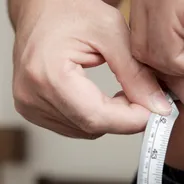Approximately one in 500 children are born with cleft palates: a birth abnormality in which a child is born with a split in the roof of their mouth, after the structures that form the upper lip or palate fail to join together when a baby is developing in the womb.
However, despite how common they are, cleft palettes aren't usually given much attention in the media. But now, a Scottish woman who experienced a childhood of bullying over hers, and who endured 12 separate corrective surgeries, wants to open up a dialogue about them.
To that end, she's travelled all around the world to meet other people with cleft palates, and has even gone as far afield as Ethiopia. Make-up artist Matilda Lansdown's first surgery occurred when she was just nine weeks old with a lip repair.
As a result of her condition, her speech was difficult to understand for most of her life, and she was forced to attend speech therapy. But three years ago she decided to get involved with Smile Train - a charity providing corrective surgery for children with her condition.
After hosting a make-up masterclass for people born with cleft lips and palates, she managed to raise £1,000 for the cause in October 2018.

Talking about her experiences growing up with a cleft palate in a recent interview, Matilda stated:
"I felt it was hard enough for me growing up with a cleft palate, but for people in developing countries, it is so much harder. Saying that though, I had expected a lot of tears and anger, but I was amazed by how happy the people I met were, and grateful for the money Smile Train had raised to help them have the surgery they need."
She added: "That operation gave me such a confidence boost, as before I had really struggled to speak loudly and clearly. Looking back on old footage afterwards, I really wondered how anyone ever understood what I was saying to them, as I was so lispy and nasally. But it gave me the impetus to speak out more and talk about the condition."
"It took me a while to understand why I was different from everybody else my age. I remember on my first day of primary school, the headteacher taking me around all the classrooms and introducing me to the pupils saying, 'This is Matilda everyone, and she has a cleft palate.'
It was an attempt to try and normalise it, but it had the total opposite effect. I was absolutely mortified and my parents were fuming ... I used to have food coming through my nose when I ate because of the hole in my palate, but the bone graft pretty much sorted that. I still had real problems talking, though. I went to a big school in Edinburgh and I would often have to repeat myself five times to be heard."

If you'd like to learn more about how you can help people born with cleft palates, then why not visit Smile Train for further information?










